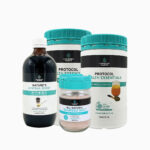Statistics show that cardiovascular disease is killing one Australian every 12 minutes, and between 2009 and 2010, half a million people were admitted to hospital with the disease.
Cardiovascular diseases include heart attack, heart failure, stroke, arrhythmia and heart valve problems. Many studies are showing that either the risk factors that can lead to cardiovascular disease, or the disease itself is highly correlated to the gut.
However, before we get to the crux of things, if someone is diagnosed with a form of heart disease, it is important to ensure many factors are considered, not just the gut. This may include looking at things like nutrient deficiencies (particularly vitamin K2, vitamin D, high antioxidant foods, coQ10, omega fatty acids, magnesium and potassium), stress, inflammatory foods, individual food sensitivities, environmental pollutants, heavy metals, household chemicals and/or biotoxins and much more. It is important to work with someone you trust when it comes to heart health, and even better to have a team of trustworthy practitioners to support you.
Gut Issues and Heart Health
The kinds of gut issues that, according to research, could be linked to your cardiovascular health include:
Low Beneficial Microbes in the Gut
The administration of beneficial microbe Lactobacillus plantarum has been associated with improved heart health, particularly with the reduction of infarct (dying tissue) size and improved left ventricular function post myocardial infarction (heart attack). In addition to this, Lactobacillus rhamnosus has also showed promising benefits after experimental myocardial infarction (in lab studies) as well. In simple terms, this means that improving the beneficial bacteria in our gut may help to maintain heart health.
Gut (and Mouth) Infections
Some evidence has shown that those with artherosclerosis (a disease of the arteries) have higher levels of harmful microbes such as Chlamydia pneumonia and H. Pylori. Other research has found that those with chronic heart failure had huge levels of pathogenic microbes (overgrowths of microbes causing issues).
Periodontal (mouth) diseases have also been highly correlated with cardiovascular disease, so it is critical to get those infections or diseases under control in order to prevent further problems.
Leaky Gut
Research has indicated that increased intestinal gut permeability (leaky gut) is strongly linked to chronic heart failure when compared to healthy individuals. Therefore, it is recommended that this is assessed and forms an important part of treatment if need be.
Gut Issues Affecting Nutrient Absorption and Production
Vitamin K2 (menaquinone) prevents atherosclerosis as it stops the calcification in the arteries by activating matrix gla protein (MGP). Vitamin K2 is found in foods like grass fed butter, natto, other fermented foods and liver, and is also produced by the bacteria in our gut. If we have issues with our gut flora, then it is likely that we may not be supplied with sufficient levels of vitamin K2, particularly if it isn’t supplied in the diet.
Moreover, microbes in our gut are required to digest and absorb nutrients, and therefore it is critical that we have adequate beneficial microbes like bifidobacterium and lactobacillus in order to digest and absorb nutrients efficiently.
Other Risk Factors Coming From the Gut
Obesity is a large risk factor of cardiovascular disease, and leptin resistance can be a huge contributing factor towards obesity. Leptin is a hormone that regulates body weight, maintains energy expenditure and reduces overall food intake. Research has shown that butyrate (a short chain fatty acid) can positively regulate leptin expression. Butyrate is produced by our gut bacteria when fibre and real food carbohydrates are consumed (particularly in the form of resistant starch like green banana flour). Increased levels of butyrate are also shown to decrease hypertension, which is a risk factor of cardiovascular disease.
What Can I do To Improve my Gut Health?
As I always say, what we put into our mouths directly influences what is living in our gut. It is critical to avoid processed foods that are highly inflammatory, such as sugar, gluten and genetically modified foods like corn and soy, and increase anti-inflammatory foods like turmeric, ginger and green vegetables. You may also want to consider increasing prebiotic foods to enhance your beneficial microbes in the form of fibre through vegetables, as well as resistant starch fibres like green banana flour and cooked and cooled starchy vegetables.
The use of antimicrobials and/or prebiotics has been shown to positively impact leaky gut, as well as lower inflammation, reduce toxins in the blood (endotoxemia) and improve glucose tolerance. However, this must be done with an experienced practitioner and we suggest using herbs and not antibiotics.
You may want to consider a comprehensive stool test to determine what infections may be lying in your gut, and what beneficial microbes you need to enhance. This can be done through most practitioners that support the improvement of gut health.
I hope this at least plants the seed for further investigation if you or a family member is suffering with a form of cardiovascular disease.









Hi From 30 +yrs in interventional cardiology ( actually opening blocked arteries and bringing people back from death) and ongoingly helping patients keep them open. Let me say that im sure theres a law against false representation of medical pathways especially when your self referring from articles such as this. Can you post what country/ state that you practise so i may inform the relevant professional bodies.
Please list the “research” that you quote especially on increased positive remodeling of the myocardium post infact using lactobacillus. I am a well published researcher in this and let me say that your claims are ignorant in the science at best. Or criminal fraud for gain at worst. Good nutrition is very important in cardiovascular health. Stick to that message. Not psuedo science for personal gain.
Hello David. Thanks for reaching out. All scientific references (as always) are included in the blog. Please contact the office directly if you would like to discuss this issue further 🙂